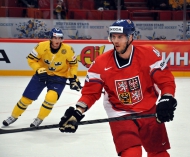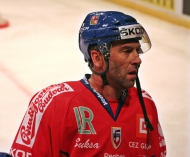Nine Czech players were selected in the 2012 KHL Entry Draft, which took place on Saturday in Chelyabinsk. Not surprisingly, the majority of them were taken by the league's lone Czech team, Lev Praha.
Two Czech centres were taken in the draft's first round, Radek Faksa of the OHL's Kitchener Rangers and Tomáš Hertl of Slavia Praha. Faksa was taken seventh overall by Neftekhimik Nizhnekamsk, while Hertl was taken 14th by Severstal Cherepovets. Both players are also projected to be first round selections in the NHL Entry Draft, which will take place in June, and the chances of either playing in the KHL within the next couple of years has to be considered slim. Faksa will probably either jump to the NHL or, more likely, remain in the Ontario Hockey League, while Hertl, who was recently named the Czech Extraliga's Rookie of the Year, will most likely return to Slavia.
Of the remaining seven players, five were chosen by Lev. Lev's first four choices were from Czech domestic clubs, three of which were from Prague teams. With their first-ever draft pick, they chose Tomáš Rachůnek, younger brother of Ivan and the late Karel, 31st overall. Considering both Tomáš and Ivan, who are ten years apart in age, play for Sparta Praha, who share Tipsport Arena with Lev, the chances of seeing the brothers in the KHL this season seem reasonable.
Roman Will of the QMJHL's Moncton Wildcats was the only Czech goaltender chosen, 166th by Lev.
Below is a list of the players selected.
7. Radek Faksa C Kitchener Nizhnekamsk
 |
| Radek Faksa was the first Czech taken in the 2012 KHL Entry Draft. Photo: sports.yahoo.com. |
Of the remaining seven players, five were chosen by Lev. Lev's first four choices were from Czech domestic clubs, three of which were from Prague teams. With their first-ever draft pick, they chose Tomáš Rachůnek, younger brother of Ivan and the late Karel, 31st overall. Considering both Tomáš and Ivan, who are ten years apart in age, play for Sparta Praha, who share Tipsport Arena with Lev, the chances of seeing the brothers in the KHL this season seem reasonable.
Roman Will of the QMJHL's Moncton Wildcats was the only Czech goaltender chosen, 166th by Lev.
Below is a list of the players selected.
7. Radek Faksa C Kitchener Nizhnekamsk
14. Tomáš Hertl C Slavia Praha Cherepovets
31. Tomáš Rachůnek L/RW Sparta Praha Lev Praha
69. Vojtěch Mozík D Mladá Boleslav Lev Praha
105. Lukáš Žejdl RW Slavia Praha Lev Praha
111. Jakub Orsava R/LW Třinec Novosibirsk
132. Jan Košťálek D Sparta Praha Lev Praha
155. Matěj Beran C P.E.I. Ufa
166. Roman Will G Moncton Lev Praha
31. Tomáš Rachůnek L/RW Sparta Praha Lev Praha
69. Vojtěch Mozík D Mladá Boleslav Lev Praha
105. Lukáš Žejdl RW Slavia Praha Lev Praha
111. Jakub Orsava R/LW Třinec Novosibirsk
132. Jan Košťálek D Sparta Praha Lev Praha
155. Matěj Beran C P.E.I. Ufa
166. Roman Will G Moncton Lev Praha



